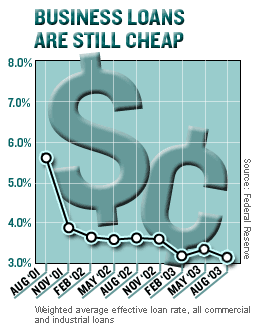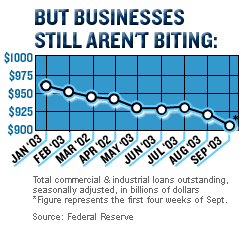NEW YORK (CNN/Money) - Though interest rates are still low, credit terms are easy, stock prices are rising and optimism about the economy is high, many businesses still aren't borrowing money, according to recent bank loan data.
Some economists say that is a worrisome sign that corporate caution lingers, though others suggest businesses may be raising funds in other ways. Cautious spending on the part of U.S. businesses has contributed to a slow recovery from the 2001 recession.

First, the facts: The dollar value of all commercial and industrial loans outstanding at U.S. commercial banks fell to $907.3 billion in the last week of September, the Federal Reserve reported recently, the lowest level since August 1998.
And businesses are fleeing from bank loans even though business lending rates are at their lowest levels in nearly 20 years. According to the Fed's latest survey of business lenders, the weighted average interest rate for all business loans was 3.15 percent in February, the lowest since the Fed started keeping track back in 1986.
"Typically, at the present stage of an economic rebound -- roughly two years after the trough in economic activity had been reached -- corporations are borrowing aggressively, funding capital expansion projects, payroll additions and inventory accumulations," Morgan Stanley economist Bill Sullivan wrote in a recent note.
"The lack of such short-term borrowing thus far in the current cycle seemingly contradicts the notion that a brisk expansion is under way."

Anirvan Banerji of the Economic Cycle Research Institute, which publishes a weekly index of leading economic indicators, said business loan activity can be a forerunner of business spending -- and recent loan data are consistent with what has been a lousy environment for spending.
Banerji said business spending depends on "three Cs" -- cash, confidence and capacity. With interest rates low, the recent tax breaks for business and corporate profits improving, there's plenty of cash available. Corporate confidence, after plunging around the time of the war with Iraq, has recovered to some degree, according to many surveys.
The biggest problem, then, has been capacity. After a frenzy of investment in new technology in the late 1990s, many businesses were left with too much production capacity, particularly in manufacturing, when the economic boom ended.
A rebound in confidence has certainly encouraged many businesses to replace worn-out equipment and to buy new gear to keep up productivity. But with pricing power still weak, cost-cutting is still the order of the day, forcing many companies to keep inventories lean and move production capacity overseas.
This could mean the that the next outburst of business investment won't come for some time. It also means that hiring, which is often the companion of business expansion, will also remain stagnant, at least for a while.
"The tap is turned on a little higher than before, so we might see a little more job growth than before," Banerji said. "But that just means we will shift from a 'job-loss' recovery to a 'jobless' recovery."
Of course, demand for business loans could pick up in a hurry. If businesses see a dramatic jump in sales, they might run to their local banker and get the short-term loans they need to start building inventories. But that inventory building hasn't begun yet, despite a recent pickup in growth.
Meanwhile, it seems businesses are raising money in other ways to fund productivity improvements and replace worn-out equipment.
With rates on longer-term corporate bonds falling, many companies are finding it more cost-effective to raise cash by selling bonds, which last longer than commercial loans, meaning they can lock low rates in for longer stretches of time, according to Stuart Hoffman, chief economist at PNC Financial Services Group.
Unlike Banerji of the ECRI, Hoffman sees the slump in business spending as having a lot more to do with simple demand than with a permanent shift in the structure of the economy.
"When the economy is growing faster and businesses want to replenish inventories and make the kind of capital expenditures, mergers and acquisitions that outstrip their internal financing, then they will turn to banks," Hoffman said, a development he thinks could come within the next three to six months.

|

